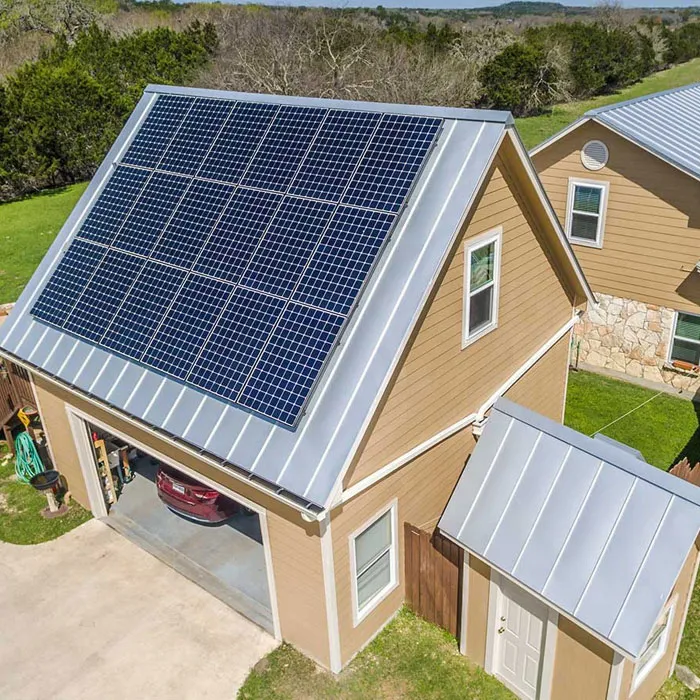Solar Heat Pumps: The Future of Energy-Efficient Heating and Cooling
2024-11-05
As the world continues to prioritize energy efficiency and sustainability, solar-powered technologies have become key players in reducing carbon footprints and lowering energy costs. One such technology gaining traction is the solar heat pump, a smart solution for both heating and cooling. Combining solar energy with heat pump technology, this system provides an environmentally friendly, cost-effective way to regulate indoor temperatures all year round. In this blog, we'll break down what solar heat pumps are, how they work, and why they are a great option for homeowners seeking energy efficiency.
What is a Solar Heat Pump?
A solar heat pump is a hybrid heating and cooling system that uses solar energy to assist the operation of a heat pump. Heat pumps are devices that transfer heat from one location to another. In winter, they extract heat from the outside air (or ground or water, depending on the system) and move it inside to warm the home. In summer, the process is reversed, with the heat pump removing heat from the indoors to cool the space.
What sets a solar heat pump apart from a traditional heat pump is its integration with solar photovoltaic (PV) panels, which capture sunlight and convert it into electricity. This electricity is then used to power the heat pump, making the system far more energy-efficient by reducing reliance on the grid.
How Does a Solar Heat Pump Work?
1. Solar Panel Electricity Generation:
Solar panels installed on your roof or property collect sunlight and convert it into electricity. This electricity powers the heat pump, which operates the compressor that drives the heat transfer process.
2. Heat Transfer Process:
In the winter, the heat pump extracts heat from the outside air, ground, or water (depending on whether it's an air-source, ground-source, or water-source heat pump). It then uses a refrigerant fluid to absorb and compress the heat, raising the temperature and transferring it into your home to warm the indoor space.
3. Cooling in Summer:
In summer, the heat pump reverses its process. It extracts heat from inside the house and releases it outside, thereby cooling the indoor environment.
4. Efficiency Boost with Solar Energy:
Because the heat pump is powered by solar electricity, it operates using renewable energy. This reduces electricity consumption from the grid and cuts down on energy bills.
Types of Solar Heat Pumps
1. Air-Source Heat Pumps (ASHP):
These systems extract heat from the outside air. They are the most common type of solar heat pump and work best in moderate climates.
2. Ground-Source Heat Pumps (GSHP):
Also known as geothermal heat pumps, these systems use the stable temperature of the earth as a heat source. They are more expensive to install but offer highly efficient heating and cooling, especially in areas with extreme weather conditions.
3. Water-Source Heat Pumps (WSHP):
These systems extract heat from a nearby water source, such as a lake or river. They are ideal for properties near bodies of water but are less common in urban areas.
Advantages of Solar Heat Pumps
1. Energy Efficiency:
Solar heat pumps are highly energy-efficient. For every unit of electricity consumed, they can provide up to 4 units of heating or cooling. This is significantly more efficient than traditional electric heaters or air conditioners, which have lower efficiency rates.
2. Reduced Energy Costs:
Solar heat pumps use solar power to operate, which means you can drastically reduce your reliance on grid electricity. Depending on the size of your system and your local solar conditions, your energy costs can be significantly lower compared to conventional heating and cooling methods.
3. Environmentally Friendly:
By harnessing solar energy, solar heat pumps reduce greenhouse gas emissions and contribute to the global effort to combat climate change. They are a sustainable and eco-friendly alternative to traditional fossil fuel-based heating and cooling systems.
4. Dual Heating and Cooling:
Solar heat pumps can provide both heating in the winter and cooling in the summer, making them a versatile, year-round solution for maintaining a comfortable indoor temperature.
5. Government Incentives:
Many governments offer incentives, tax credits, and rebates for homeowners who install renewable energy systems like solar heat pumps. These incentives can help offset the upfront installation costs and make the system more affordable.
Challenges of Solar Heat Pumps
1. Upfront Cost:
The initial cost of installing a solar heat pump system can be higher than traditional heating and cooling systems. However, this cost can be offset by lower energy bills and available rebates over time.
2. Space Requirements:
Solar panels require space to generate enough electricity to power the heat pump. Homes with limited roof space or properties with poor sunlight exposure may face challenges in making the system work efficiently.
3. Climate Limitations:
Solar heat pumps rely on sunlight, so in areas with cloudy weather or less sunlight, the efficiency of the system may be reduced. A hybrid system that combines grid electricity with solar power can help mitigate this issue.
Is a Solar Heat Pump Right for You?
If you live in a sunny area and are looking for a renewable energy solution to efficiently heat and cool your home, a solar heat pump is an excellent choice. While the initial investment may be higher than conventional systems, the long-term savings on energy bills and the environmental benefits make it a wise investment. Plus, with government incentives and rebates, the upfront costs can be more manageable.
For homeowners who want to reduce their carbon footprint, save on energy costs, and enjoy year-round comfort, a solar heat pump system offers a sustainable, cost-effective, and reliable solution.
Solar heat pumps represent the future of heating and cooling—efficient, eco-friendly, and cost-effective. By integrating solar energy with the advanced technology of heat pumps, these systems offer an innovative solution for homeowners seeking to reduce their environmental impact and energy bills. If you're interested in making your home more sustainable while staying comfortable year-round, a solar heat pump could be the ideal choice.



